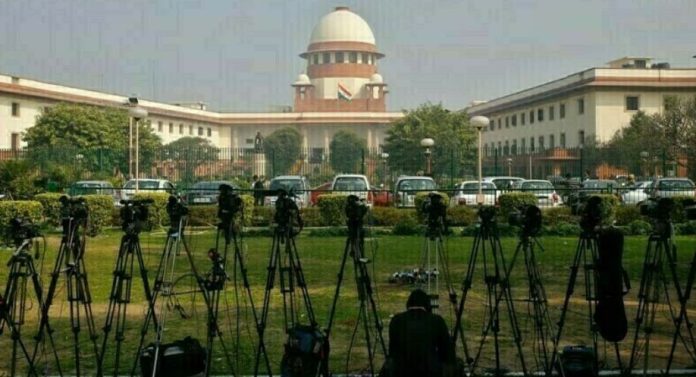New Delhi, AUG 29: India’s Supreme Court has asked the Narendra Modi-led government if there was a “timeframe” and a “roadmap of progression” to restore the special status of held Kashmir, Indian media outlets reported on Tuesday.
The remarks were passed by a five-member bench headed by Chief Justice of India (CJI) D.Y. Chandrachud during a hearing on a batch of petitions challenging the reading down of Article 370 of the Indian constitution, which bestowed special status on India-held Jammu and Kashmir.
The move allowed people from the rest of the country to have the right to acquire property in occupied Kashmir and settle there permanently.
Kashmiris, international organisations and critics of India’s Hindu nationalist-led government had termed the move an attempt to dilute the demographics of Muslim-majority Kashmir with Hindu settlers.
During the hearing today, The Indian Express quoted the CJI as asking Solicitor General Tushar Mehta: “We understand that these are matters of national security… the preservation of the nation itself is the overriding concern. But without putting you in a bind, you and the attorney general may seek instructions on the highest level— is there a timeframe in view? Is there a roadmap?”
According to the publication, Mehta is representing the Indian government and the administration of held Kashmir.
In his arguments, Mehta touched on the reorganisation of states and told the bench about decisions taken with regard to held Kashmir in the aftermath of the Article 370 changes.
“As we see the creation of UTs, you have on one hand, examples like Chandigarh, carved out of Punjab and remained a UT. Then you have a progression where certain areas become UTs… you can’t immediately make them states,” The Indian Express quoted the CJI as saying.
Justice Chandrachud also asked if the Indian parliament should not be permitted to convert a state into a union territory for a limited period of time in view of national security needs.
“Why was it not possible for the union to say that right now in the case of a state, we have such an extreme situation in terms of national security, that we want for a certain period that a UT should be created? But this is not permanent and this shall be back as a state… can a union not do that for a certain period, to bring stability? Because let’s face it, whether it’s a state or UT, all of us survive if a nation survives.
“Should we not permit parliament to postulate that for a certain period, in the interest of the preservation of the nation itself, we want for a certain period that this particular state shall go in fold of UT — on the clear understanding that this shall revert back to a state,” the CJI was quoted as saying.
He added that “the government also has to make a statement before us that progression has to take place. It can’t be a union territory permanently”.
Mehta, the Indian publication said, told the bench that a similar statement was made by a minister in the parliament as well.
Separately, the Hindustan Times reported the solicitor general as saying that there was “enough material to show that the constitution of held Kashmir is subordinate to the constitution of India and the constituent assembly of [held] Jammu and Kashmir was in reality a legislative assembly making laws”.
“On November 21, 2018, the legislative assembly of the state was dissolved but there was no contemporaneous challenge by any political party or any citizen or leader.
“Till, today there is no challenge to the dissolution of the assembly,” Mehta said, further adding that the Governor’s rule was imposed in the held Kashmir due to the failure of constitutional machinery in the state and only one petition was filed against it after 14 months.
The Indian Express reported that after the arguments, the CJI said “we take your point that progression has already begun” and, rising shortly before the lunch break, asked Mehta to explain the roadmap.

















